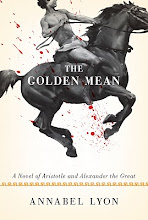
Alexander The Great
Originally uploaded by Philippe C.
I knew I wanted the kid to be annoying. There's a reverent literary tradition around Alexander, beginning with his first biographers (Arrian, Plutarch), through the so-called Alexander Romances of Medieval times (where he often had superpowers), right up to the present (most recently with Oliver Stone's 2004 biopic Alexander, featuring Irish heartthrob Colin Farrell).
But years as a teacher have taught me that teenagers with brains and talent are often the most arrogant, insecure, and impossible students of all. I wanted to create a character who would both defy expectations and be immediately recognizable to anyone who's ever had to deal with an exceptionally bright, difficult teenager. I pictured the young Alexander as an annoying narcissist who needed to be taken down a few notches. Just the job for my fictional Aristotle, whose brilliance I much preferred (in the beginning, anyway) to Alexander's brawn.
But I struggled. Early readers told me they believed Alexander as an annoying teenager but couldn't see the seeds of the man who would conquer the world. The more I thought about him, the more he bothered me. I knew he needed to be more than just a smart-aleck, but I still couldn't buy into the tradition of the sexy, hotheaded military genius.
The penny finally dropped when I read an article in the September 29, 2008 New Yorker about an Iraq war veteran suffering from post-traumatic stress disorder (William Finnegan's "The Last Tour"). I was struck by the symptoms Finnegan described--headaches, nightmares, alcoholism, loss of touch with reality, and most of all the paradoxical desire to be at home when you're at war and at war when you're home. These symptoms fit the later Alexander (an alcoholic given to fits of blinding violence immediately followed by crippling depressions, who left home at 19 and never returned).
The more I thought about the boyhood that must have preceded this tormented life, the more I wondered if the trauma might have begun very early indeed. His parents by all accounts hated each other. His father took numerous wives and produced half-siblings often enough to keep the young prince's expectations about his future off-balance. His mother was suspected of witchcraft. Alexander was trained as a child soldier, leading troops into battle when he was only 16.
Child soldiers exist today, and we know what damage and trauma they suffer (when we allow ourselves to think about them at all). An ancient child would have suffered no less. Once I understood that, I understood how to proceed with the character I now cared and feared for as much as anyone in the novel.

No comments:
Post a Comment